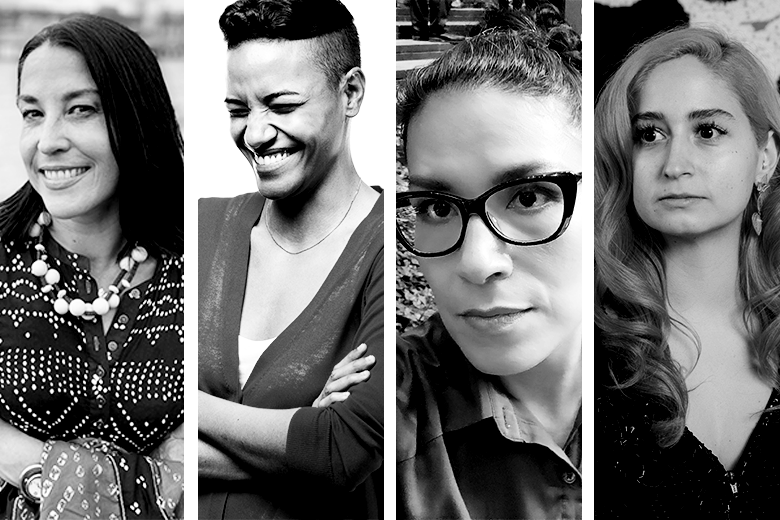Event Info
Join noted scholar Arlene Dávila, NYU Professor and author of the acclaimed Latinx Art: Artists, Markets, and Politics (Duke University Press, 2020) in a discussion about the strategies Latinx artists have pursued to create platforms for their work. Artists Glendalys Medina, Mary Valverde, and Sarah Zapata from the Latinx Abstract exhibition will join Dávila in the discussion.
Zoom information will be shared with registrants closer to the event date.
About the speakers
Arlene Dávila (she/her) is a Professor of Anthropology and American Studies at New York University whose research spans urban ethnography, the political economy of culture and media, consumption, immigration and geographies of inequality and race. Her work has focused on the ethnographic study of the local, national and global dynamics of contemporary U.S. Latino/a and Latin American cultural politics. She is also the Founding Director of the Latinx Project at NYU.
Glendalys Medina (she/her, they/them) was born in Ponce, Puerto Rico and is based in New York. Through a process of abstracting and reconstituting forms drawn from both traditional and contemporary popular culture, Glendalys Medina creates a visual syntax that acts as both a personal language and as an autonomous, self-validating expression of personal identity. Medina’s work, made from such materials as handmade paper, thread, nails, LED lights, marker, and spray paint, examines patterns of visual representation within written language, musical notation, and symbols. Glendalys Medina has had solo shows and performances/screenings at Participant Inc., The Kitchen, Artists Space, and The New Museum, all NY. She has been featured in group shows at The Studio Museum in Harlem; and El Museo del Barrio, both NY; and the Pérez Art Museum, Miami, FL. Medina has participated in residencies at the ACE Hotel New York and at Yaddo. She is the recipient of the Pollock Krasner Foundation Grant, the Jerome Hill Artist Fellowship, and EFA Robert Blackburn Printmaking Workshop Studio Immersion Project Fellowship. Medina’s work is in the permanent collections of Studio Museum in Harlem; Cleveland Clinic Collection, OH, and Google. Medina is currently a faculty member at The School of Visual Arts, NY. She received their BFA and MFA from Hunter College.
Mary Valverde (she/her) was born in Queens and is based in New York. Interested in the intersections between such fields as physics, mathematics, spirituality, and the visual arts, Mary Valverde seeks to give visual form to both the material and less perceptible aspects of culture. The geometric form, patterns, and symmetry that she elaborates through her analytical process explore the legacy of indigenous American visual traditions and ideas of sacred geometries as well ingrained cultural patterns of organizing space and form. Through her works, she seeks to employ abstraction for its formal qualities as she expresses balance and restraint, tension and movement, and the relationship of the body to space and form. Mary Valverde has exhibited at Smack Mellon, Brooklyn; the Queens Museum of Art; BronxArtSpace, Bronx; El Museo del Barrio, NY; and the Museum of Contemporary Art, North Miami, FL, among others. She has had residencies at Gallery Aferro and Aljira Center for Contemporary Art, both Newark, NJ; and at the Thomas Hunter Project Space, NY. Valverde has lectured at the U.S. Latinx Forum, the Joan Mitchell Foundation; the US Latinx Arts Futures Symposium; the Ford Foundation, NY; the University of Pennsylvania; Stanford University, CA; and at other institutions. Valverde is Assistant Professor at Hunter College, City University of New York. She earned her BFA from The School of Visual Arts, NY, and her MFA from The University of Pennsylvania.
Sarah Zapata (she/her) was born in Corpus Christi, TX and is based in Brooklyn, NY. Sarah Zapata’s sculptures, installations, and performances elicit both the intricacies and intimacies of the body and its social/spatial interrelations. The meditative and repetitive nature of her textile-based processes call forth the conventions—and stigmas—surrounding traditional women’s work, while also providing the framework for her to explore the specificities of her own identity as a first-generation American of Peruvian heritage, a lesbian raised in a Christian Evangelical household, and now, as a Texan based in Brooklyn. Zapata underscores the transformational possibility of the textile; with her mode of working, they can evoke, with their boundary pushing forms, tradition, the erotic and the fetishistic, the spiritual, and the political. In her performance work, Zapata has underscored textile’s inextricable relation to the body. Sarah Zapata has had solo exhibitions at Deli Gallery, Museum of Arts and Design, and El Museo del Barrio, all NY; and Museo MATE, Lima, Peru. She has taken part in group exhibitions and has performed at such institutions as MoMA PS1, Long Island City; the Knockdown Center, Queens; 6BASE, Bronx; NADA House, Governor’s Island, the Leslie-Lohman Museum of Gay and Lesbian Art, the Museum of Arts and Design, New Museum, Bard Graduate Center, all NY; LAXart, Los Angeles, CA. The artist has taken part in residencies at the Museum of Arts and Design and Wave Hill, both NY; and MASS MoCA, North Adams, MA. She received a BFA from The University of North Texas, Denton.
